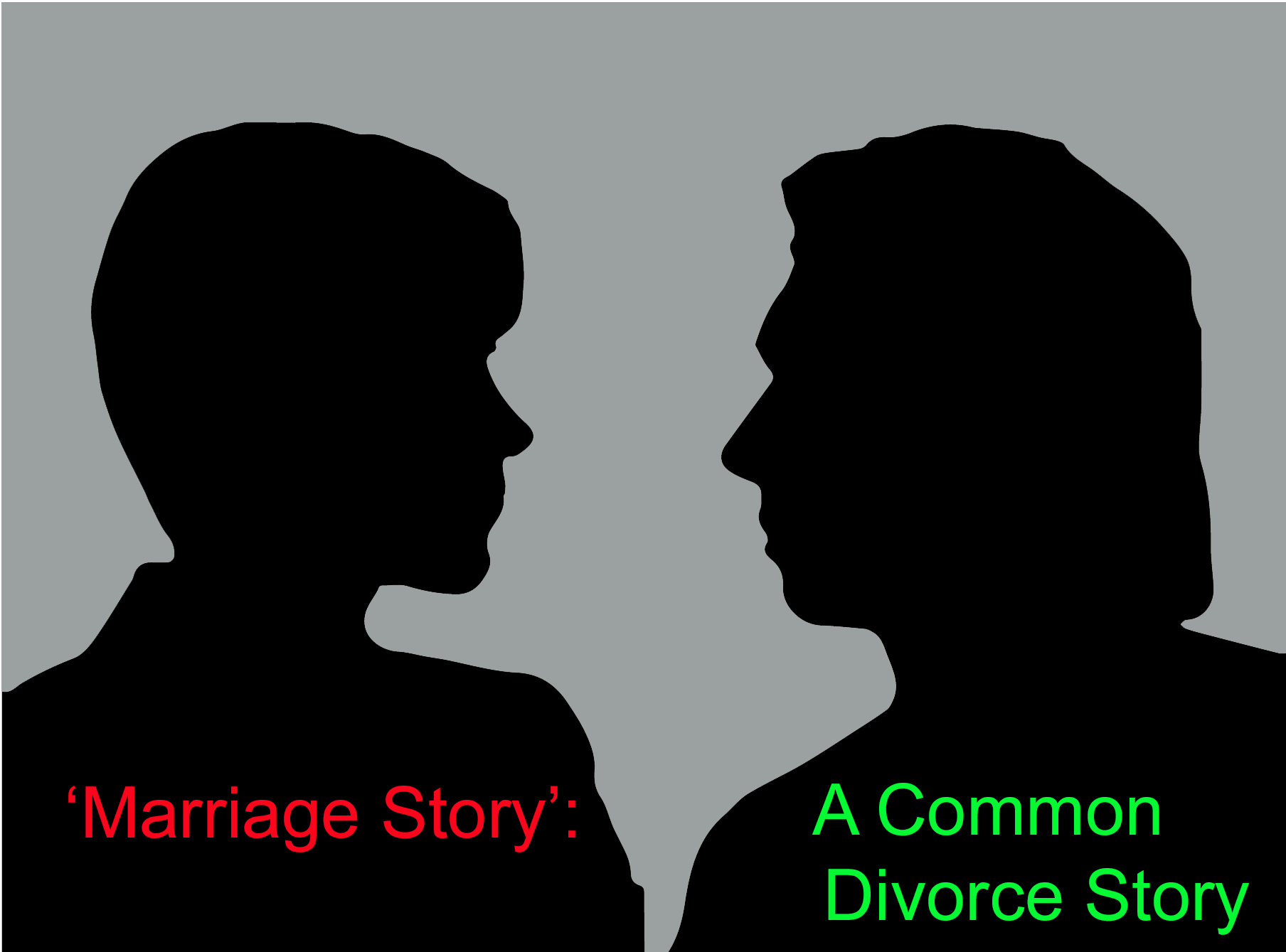‘Marriage Story’: A Common Divorce Story

In the Netflix movie, ‘Marriage Story,’ Adam Driver stars as Charlie, a stage director who struggles through a litigious and costly divorce from his wife, Nicole, played by Scarlett Johansson. They live in New York with their son Henry who is played by Azhy Robertson. The movie begins with Nicole and Charlie attempting divorce mediation, which fails after the mediator requested that they first write about each other’s best qualities. Initially they agreed to keep the divorce simple and amicable, but becomes suddenly difficult and complex after Nicole accepts a role in a television show and moves to California with their son Henry. Nicole gave up her career as a successful film actress so Charlie could establish his career as a stage director. Charlie establishes a fledgling theatre company and becomes a rising star in the world of theatre. In the meantime, Nicole loses her identity as she caters to Charlie’s growing success and as Charlie becomes increasingly self-serving. Once in California, Nicole hires Nora Fanshaw, a divorce attorney played by Laura Dern, who won the Oscar for best supporting actress, and initiates a lawsuit against Charlie for divorce. The divorce becomes adversarial that leads to rising tensions, expensive lawyer fees, and ugly exchanges during court proceedings. After a destructive, costly, and emotional rollercoaster ride, the couple’s legal settlement results in the splitting of assets and a co-parenting plan similar to the couple’s initial private agreement. ‘Marriage Story’ is a great example of how costly, destructive, and emotional litigation is for the parties involved in divorce.
Divorce is expensive. I used to joke they were going to call it ‘all the money,’ but they changed it to ‘alimony.’ It’s ripping your heart out through your wallet.
Robin Williams
According to Statistics Canada, divorce affected over five million Canadians in 20 years since 2011. The Divorce Act is the law that deals with marriage breakdown in Canada. The Divorce Act addresses how married spouses get divorced, the care of the children after separation (parenting order, parenting time and decision-making responsibility), child support, and spousal support. In addition, on May 22, 2018, the government introduced Bill C-78 to strengthen the Canadian family justice system. Bill C-78 received Royal Assent on June 21, 2019 and most of the amendments to the Divorce Act will come into force on July 1, 2020. This new legislation makes federal family laws more responsive to families’ needs. Its four key objectives are:
Given that family law affects more Canadians than any other area of law, the amendment encourages the use of alternative dispute resolution and other family justice services to improve outcomes for children and families. Specifically, the family dispute resolution process (Section 7.3, Divorce Act) states:
Family dispute resolution process
7.3 To the extent that it is appropriate to do so, the parties to a proceeding shall try to resolve the matters that may be the subject of an order under this Act though a family dispute resolution process.
What is the family dispute resolution process? Generally, dispute resolution refers to negotiation, mediation, and or arbitration. These processes and techniques are designed to help parties come to an agreement prior to ligation, which is adversarial.
Mediation and Arbitration
Family mediation is an alternative to litigation that allows the couple to come to a mutual resolution. A key benefit of mediation is that the individuals going through divorce preserve their identity and make their own decisions on how to settle the distribution of property, coordinate parenting, and determine the amount of support to be paid.
A combined family mediation-arbitration process is where a couple engage and acknowledge at the beginning of the process that they have jointly appointed a sole mediator who also acts as an arbitrator. This means that should there be an impasse in mediation, an arbitration hearing can be initiated. Furthermore, this means that the appointed mediator/arbitrator can translate agreements reached in mediation to a binding ‘Consent Award’. The end result is that an arbitrator’s decision or ‘Award’ is similar to a court order and it is final and binding.
It is important to note that a family mediator acts as a facilitator to assist in the complexities of divorce and resulting conflicts. The family mediator is required to be discrete, diplomatic, and sensitive to the couple’s situation to enable them to communicate, negotiate, and cooperate to resolve their issues outside of court. Generally, a detailed step-by-step process is disclosed to the couple at the outset with regular follow-up once the process is initiated. All aspects of family mediation is best conducted face-to-face to ensure clarity between all parties. In the end, the family mediator/arbitrator’s goal is to help couples come to an agreement that can be honoured, enforceable, and held accountable to.
A divorce is like an amputation: you survive it, but there’s less of you.
Margaret Atwood
The amount of time required to get through any particular issue varies significantly for each individual and is uniquely different for each couple. Unlike in the beginning of ‘Marriage Story,’ discussing each other’s positive attributes is not a realistic approach to mediation. The discussions are not warm and fuzzy. They are difficult and emotional. You have to give yourself time to work through the dispute resolution process, and prepare your heart and mind for a healthy discussion on how to unravel the conflict in your relationship. The family dispute resolution process is voluntary, but the couple must remain committed to the process. Children benefit from the family dispute resolution process because the couple stops the retaliatory cycle of conflict of fighting with each other and come together to start working on their problems amicably in the spirit of reconciliation, not as adversaries in conflict. As a result, family dispute resolution improves communication skills between the divorcing couple, and the family mediator helps the couple reach voluntary resolutions to their dispute that is timely, equitable and cost effective.
You can come at it very aggressively and blame and blame and blame. Or you can put yourself in the garage, so to speak. Take yourself apart and clean off the bits. Reassemble.
Chris Martin, lead vocalist, Coldplay


Dora Dang
Dora Dang is a Chartered Arbitrator, Chartered Mediator, Certified Divorce Financial Analyst, Registered Family Mediator of Alberta and a Commissioner For Oaths in and for Alberta. She is the co-owner and co-founder of Leap! Divorce Solutions Ltd.
